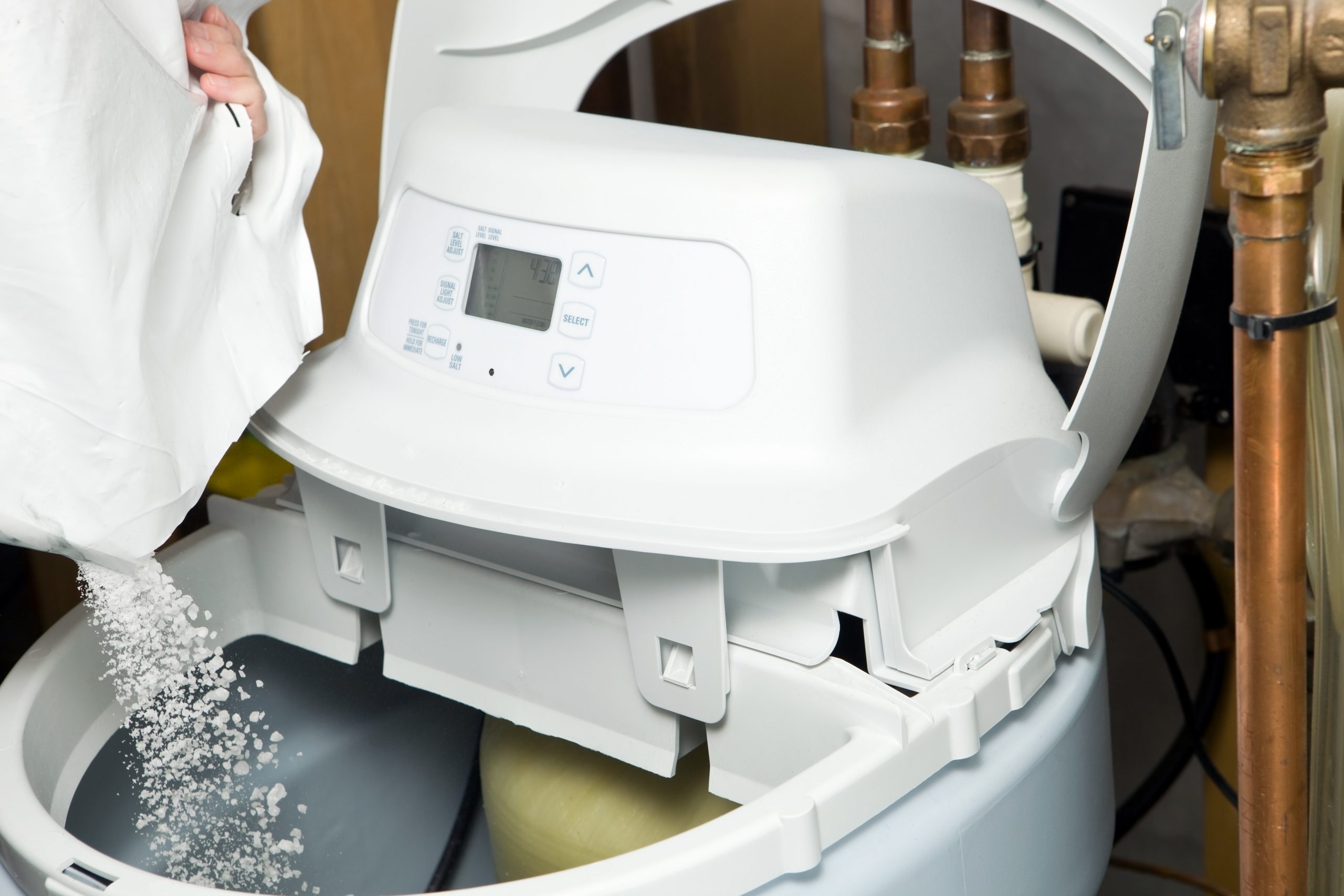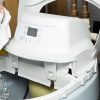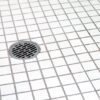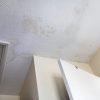Category: Water Softeners & Iron Filters

The Ultimate Guide to Water Softener Maintenance
Water softeners are a quiet hero in many Minnesota homes, working tirelessly behind the scenes to fight hard water. They save you money, protect your appliances, and make your skin and hair feel great. But like any hard-working appliance, a water softener needs a little routine care to keep it running smoothly.
This guide will walk you through everything you need to know about water softener maintenance, so you can continue to enjoy the benefits of soft water for years to come.
How a Water Softener Works
Before we dive into maintenance, let’s quickly review how a water softener does its job. The process, called “ion exchange,” is simpler than it sounds.
Your water softener contains a tank filled with thousands of tiny resin beads. These beads have a negative charge, which attracts positively charged minerals like calcium and magnesium, the main culprits of hard water. As hard water flows through the resin tank, these minerals stick to the beads, and the beads release sodium ions in their place. This “exchange” is what makes your water soft.
Over time, the resin beads become saturated with hard minerals and need to be cleaned. This cleaning process is called regeneration. To regenerate, the system floods the resin tank with a saltwater solution from the brine tank. The concentrated salt solution washes the calcium and magnesium off the resin beads, sending the mineral-rich water down the drain. The beads are now ready to soften water again.
Signs Your Water Softener Needs Maintenance
If your system isn’t working correctly, you’ll start to notice some of the classic signs of hard water returning. Be on the lookout for:
- Stiff, Dingy Laundry: Your clothes may feel rough after a wash, and whites can start to look gray.
- Spotty Dishes: You’ll see cloudy film or white spots on your glassware and silverware, even after a run through the dishwasher.
- Lack of Suds: Soap and shampoo won’t lather as well as they should.
- Dry Skin and Hair: Hard water residue can leave your skin feeling dry and your hair looking dull.
- Reduced Water Pressure: Mineral buildup in your pipes can restrict water flow, causing a noticeable drop in pressure.
Easy DIY Maintenance Tips
The good news is that most of the basic maintenance for your water softener is easy to do yourself. Here are a few simple steps to keep your system happy.
- Check Your Salt Levels: This is the most important and most frequent task. Make sure the brine tank is always at least half-full of salt. If you let the salt level drop too low, your system won’t be able to regenerate properly, and you’ll get hard water.
- Break Up Salt Bridges: A salt bridge is a hard crust that can form in the brine tank. It’s caused by high humidity, using too much salt, or using impure salt. The salt bridge creates an empty space below it, which prevents the salt from dissolving and a proper saltwater solution from forming. To check for one, gently push a broom handle into the salt to see if there’s a hard layer beneath the surface. If you find one, carefully break it apart.
- Clean the Brine Tank: Every one to two years, you should clean the brine tank to remove any sediment or sludge that has built up at the bottom. This is a simple process of scooping out the remaining salt, flushing the tank with a hose, and then refilling it.
When to Call a Professional Plumber
While DIY maintenance is great for day-to-day care, there are times when you should always call a professional.
A plumber can perform a comprehensive tune-up that goes beyond what you can do at home. They will test your water hardness, check the regeneration cycle, inspect the resin bed, and make sure all the system’s components—like the control valve and drain lines—are working as they should. This professional service can catch minor issues before they become major, costly repairs.
If you are experiencing any of the following, it’s time to call a pro:
- Your water is still hard even after you’ve checked the salt levels.
- The system won’t regenerate or is constantly running.
- You notice an unusual amount of water in or around the brine tank.
- There’s a significant drop in your water pressure.
- The system is making unusual noises.
At Robillard Plumbing, we’ve been the trusted name for plumbing services in the Northwest Metro area since 1986. We have the expertise to handle everything from water softener installations to routine maintenance. Our team can help diagnose any issues, perform a thorough cleaning, and ensure your system is running efficiently to protect your home.
Don’t let hard water headaches ruin your day. Contact us today to schedule your water softener maintenance service and ensure your home is protected and running smoothly.
Read More
5 Signs You Need a Water Softener
Hard water, filled with high levels of calcium and magnesium, can cause a variety of problems in your home. Sometimes these issues are obvious, other times they are more subtle. But whether you are dealing with an annoying inconvenience or a hidden but costly problem, hard water is bad news for you and your plumbing. But how do you know if your home is suffering from hard water? Let’s take a look at these common signs that you need a water softener.
Hard Water Deposits
The minerals found in hard water can leave behind residue and stains in various places around your home. This is commonly seen in scale buildup on your faucets, showerheads, and even appliances. You might also notice white spots on your glassware and dishes. When hard water mixes with soap, it creates a stubborn film-like substance that sticks to surfaces. This soap scum is commonly found in bathtubs, showers, and sinks.
Laundry Issues
Hard water can damage your clothes and make it harder to keep them clean. Just like with soap scum, this is due to the way that minerals in hard water interact with soap and detergent. Hard water can leave your clothes feeling stiff or rough. It is also likely to wear them out and cause discoloration. The iron in hard water can even turn white clothes yellow. These issues mean you’ll need to use significantly more detergent to keep your laundry clean. If you find yourself constantly running out of detergent, you would benefit from a water softener.
Skin and Hair Problems
Soap doesn’t lather or wash off effectively in hard water, meaning much of it is left behind on your skin. This soap then absorbs your body’s natural moisture, leaving you feeling dried out and itchy. Mineral deposits in the water have a similar effect, sapping much of the moisture from your skin. Some research suggests that hard water may even worsen conditions of eczema. Hard water also dries out your hair, leaving it frizzy and brittle.
Plumbing Problems
Over time, mineral deposits from hard water can build up inside your pipes, reducing water flow and leading to frustrating clogs. This can lower water pressure throughout your home, making it difficult to enjoy a satisfying shower, fill up the bathtub, and wash dishes. Minerals can also build up inside your water heater, reducing its efficiency, raising your energy bills, and shortening its lifespan.
Worn Out Appliances
Hard water can have detrimental effects on a variety of appliances in your home. Mineral buildup reduces the effectiveness and efficiency of dishwashers and washing machines in addition to causing internal damage. It can also clog your coffeemaker and affect the taste of your coffee. Ice makers are another common victim of hard water, which can suffer from reduced ice production and bad-tasting ice.
Say Goodbye to Hard Water
As we’ve seen, hard water can cause numerous problems in your home, from minor annoyances to costly damages. If you’re experiencing any of the signs mentioned above, it’s likely that you have hard water. Fortunately, investing in a water softener can fix these issues and greatly improve the quality of your water. At Robillard Plumbing, we are experts in choosing the right water softener for your home. Contact us to discuss installing one today!
Read More


